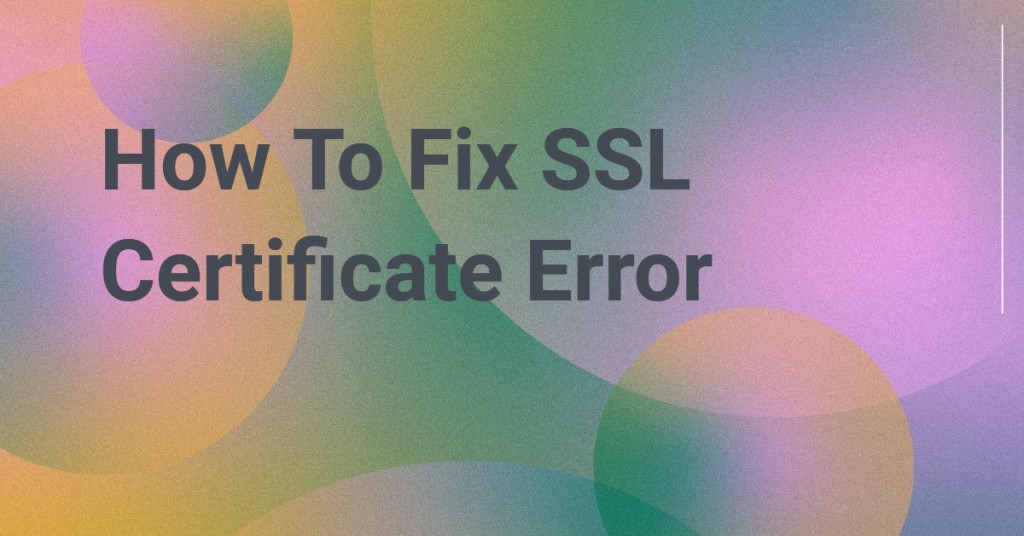
An SSL certificate is an official security technology for encoding data between a visitor’s browser and your website. Because it helps keep private data like passwords and payment reports safe, visitors feel more secure on encrypted sites with SSL. You can recognize encoding sites by the HTTPS in their URLs and the lock icon in the address bar. There might be many traffic or conversion rates analyzed as an outcome if there is no encryption seen in sites. Not only are these sites waved as Not secured in Google Chrome, but they’re also ignored by 85% of online buyers. Further, you will be reading about the types of SSL error and their rectifications.
Table of Contents
Kinds of SSL Certificate Errors
There are many distinct kinds of SSL errors that might arise on your site. Below mentioned are some fundamental errors:
• SSL Certificate an Untrusted Error
This error shows that the SSL certificate is confirmed by a company that the browser does not trust. That means either the firm, known as the certificate power, is not on the browser’s built-in list of advanced certificate givers or that the server itself allotted the certificate. Certificates issued by the server are often related to as self-signed affidavits.
• Name Mismatch Error
This error shows that the SSL certificate’s domain name doesn’t meet the URL copied into the browser. This message can be let by something as easy as www. Say the certificate is filed for www.mysite.com, and you place it in https://mysite.com. Then you’ll receive an SSL certificate title error.
• Mixed Content Error
This error shows that a secured page, filled with HTTPS in the address bar, holds a factor loaded from an unsecured page, one that is loaded with HTTP in the address bar. Even if there’s just one insecure data on a page, often an icon, frame, Flash animation, or bit of JavaScript, your browser will show an error message rather than loading the page.
• Expired SSL Certificate Error
This error arrives when the site’s SSL certificate expires. According to terms set by the Certificate Browser (CAB) meeting, SSL certificates cannot validate more than 27 months. That means that every website requires to restore or replace its SSL certificate after every two years.
How to Get Over SSL Certificate Error
• Verify the problem with an online tool
To begin, use an online tool to verify the problem creating the SSL error on your site. You can apply a tool like SSL Checker, SSL Certificate Checker, or SSL Server Test, which will check that an SSL certificate is not expired and is installed, that the field name is rightly noted on the certificate, and more. To apply the tool, copy and paste your site link into the search bar.
• Install a central certificate on your web server
If the problem is that your SSL certificate power is not trusted, then you may require to install at least one central certificate on your web server. Central certificates help browsers verify that a proper root certification power published the website’s certificate.
• Form a new Certificate Signing Request (CSR)
If you’re still receiving a certificate not trusted error, then you could have installed the certificate inaccurately. You can create a new CSR from your server and reissue it from your certificate giver in that state. Steps will differ depending on your server.
• Update to a dedicated IP address
If you’re receiving a name mismatch error, then the issue may be your IP address.
When you type your realm name into your browser, it first joins your site’s IP address and then goes to your site. Usually, a website has its IP address. But if you use a kind of web hosting other than committed hosting, your site may be linking an IP address with many sites. If those websites do not comprise an SSL certificate installed, a browser might not know which location it has to visit and show a mismatch name error message. To fix the issue, you can update to a committed IP address for your site.
• Get a wildcard SSL certificate.
If you still have a name mismatch error, you may require getting a wildcard SSL certificate. This kind of certification will let you secure many subdomain names as well as your root domain. For case, you could get one Multi-Domain SSL Certificate to meet all of the following terms:
- mysite.com
- mail.mysite.com
- autodiscover.mysite.com
- blog.mysite.com
• Switch all URLs to HTTPS.
If you’re receiving a merged content error on one of your web pages, then paste the URL into WhyNoPadLock.com to know the insecure parts. Once you’ve put the details, edit the page’s reference code and switch the unknown parts’ URLs to HTTPS.
• Replace your SSL certificate.
If your SSL certificate is expired, you’ll have to replace it quickly. The details of the restoration method change relying on the web host or certificate rights you’re using, but the steps stay the same. You’ll need to create a CSR, initiate your certificate, and install it.
Conclusion
Therefore, these were the stepwise process to fix the SSL error on your sites. The prime step is to install the SSL certificate to get rid of all problems. It will help you to generate your HTTP URL precisely and automatically. For more detailed information, check out our website.
Author Bio:
Naman Modi is a Professional Blogger, SEO Expert & Guest blogger at ebuilderz.com, He is an Award-Winning Freelancer & Web Entrepreneur helping new entrepreneur’s launches their first successful online business.


